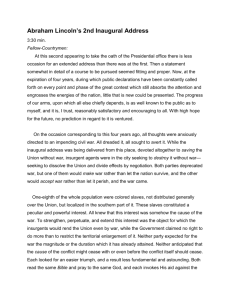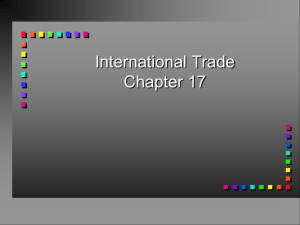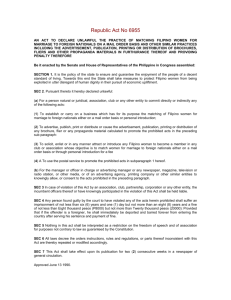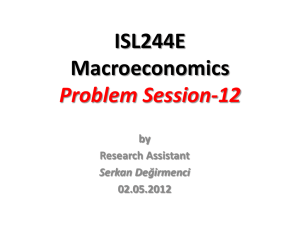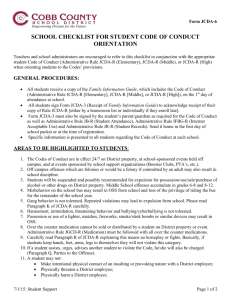Cybercrime Prevention Act of 2012
advertisement
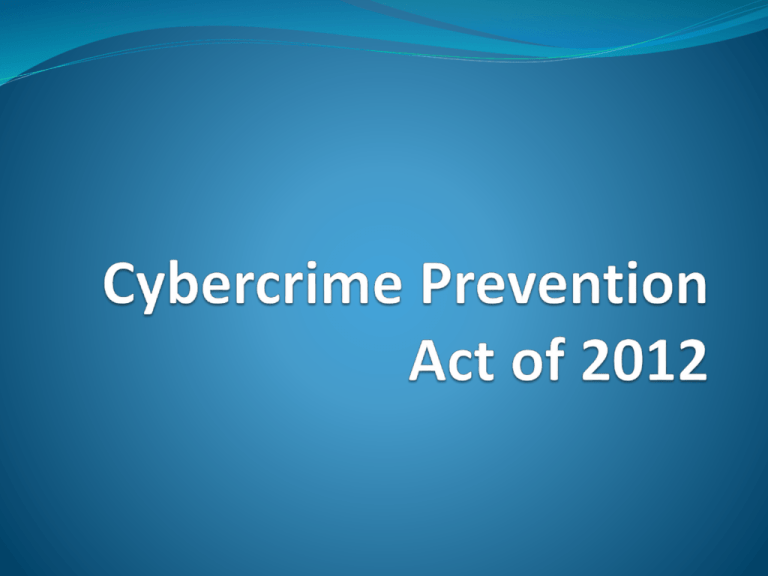
Agenda Provisions Policy Punishable Acts Penalties Enforcement Issues Status SEC. 2. Declaration of Policy.— The State recognizes the vital role of information and communications industries such as content production, telecommunications, broadcasting electronic commerce, and data processing, in the nation's overall social and economic development. The State also recognizes the importance of providing an environment conducive to the development, acceleration, and rational application and exploitation of information and communications technology (ICT) to attain free, easy, and intelligible access to exchange and/or delivery of information; and the need to protect and safeguard the integrity of computer, computer and communications systems, networks, and databases, and the confidentiality, integrity, and availability of information and data stored therein, from all forms of misuse, abuse, and illegal access by making punishable under the law such conduct or conducts. In this light, the State shall adopt sufficient powers to effectively prevent and combat such offenses by facilitating their detection, investigation, and prosecution at both the domestic and international levels, and by providing arrangements for fast and reliable international cooperation. PUNISHABLE ACTS SEC. 4. Cybercrime Offenses—The following acts constitute the offense of cybercrime punishable under this Act: (a) Offenses against the confidentiality, integrity and availability of computer data and systems: (1) Illegal Access. — The access to the whole or any part of a computer system without right. (2) Illegal Interception. — The interception made by technical means without right of any non-public transmission of computer data to, from, or within a computer system including electromagnetic emissions from a computer system carrying such computer data. (3) Data Interference. — The intentional or reckless alteration, damaging, deletion or deterioration of computer data, electronic document, or electronic data message, without right, including the introduction or transmission of viruses. (4) System Interference — The intentional alteration or reckless hindering or interference with the functioning of a computer or computer network by inputting, transmitting, damaging, deleting, deteriorating, altering or suppressing computer data or program, electronic document, or electronic data message, without right or authority, including the introduction or transmission of viruses. (5) Misuse of Devices. (i) The use, production, sale, procurement, importation, distribution, or otherwise making available, without right, of: (aa) A device, including a computer program, designed or adapted primarily for the purpose of committing any of the offenses under this Act; or (bb) A computer password, access code, or similar data by which the whole or any part of a computer system is capable of being accessed with intent that it be used for the purpose of committing any of the offenses under this Act. (ii) The possession of an item referred to in paragraphs (i)(aa) or (bb) above with intent to use said devices for the purpose of committing any of the offenses under this section. (6) Cyber-squatting. - The acquisition of a domain name over the internet in bad faith to profit, mislead, destroy reputation, and deprive others from registering the same, if such a domain name is: (i)Similar, identical, or confusingly similar to an existing trademark registered with the appropriate government agency at the time of the domain name registration; (ii) Identical or in any way similar with the name of a person other than the registrant, in case of a personal name; and (iii) Acquired without right or with intellectual property interests in it. (b) Computer-related Offenses: (1) Computer-related Forgery. (i) (ii) The input, alteration, or deletion of any computer data without right resulting in inauthentic data with the intent that it be considered or acted upon for legal purposes as if it were authentic, regardless whether or not the data is directly readable and intelligible; or The act of knowingly using computer data which is the product of computer-related forgery as defined herein, for the purpose of perpetuating a fraudulent or dishonest design. (2) Computer-related Fraud - The unauthorized input, alteration, or deletion of computer data or program or interference in the functioning of a computer system, causing damage thereby with fraudulent intent: Provided, That if no damage has yet been caused, the penalty imposable shall be one (1) degree lower. (3) Computer-related Identity Theft. - The intentional acquisition, use, misuse, transfer, possession, alteration or deletion of identifying information belonging to another, Whether natural or juridical, without right: Provided, That if no damage has yet been caused, the penalty imposable shall be one (1) degree lower. (c) Content-related Offenses: Cybersex - The willful engagement, maintenance, control, or operation, directly or indirectly, of any lascivious exhibition of sexual organs or sexual activity, with the aid of a computer system, for favor or consideration. Child Pornography. - The unlawful or prohibited acts denied and punishable by Republic Act No. 9'775 or the Anti-Child Pornography Act of 2009, committed through a computer system: Provided, That the penalty to be imposed shall be (1) one degree higher than that provided for in Republic Act No. 9775. Unsolicited Commercial Communications. - The transmission of commercial electronic communication with the use of computer system which seek to advertise, sell, or offer for sale products and services are prohibited unless: There is prior affirmative consent from the recipient; or The primary intent of the communication is for service and/or administrative announcements from the sender to its existing users, subscribers or customers; or (iii) The following conditions are present: (aa) The commercial electronic communication contains a simple, valid, and reliable way for the recipient to reject receipt of further commercial electronic messages (opt-out) from the same source; (bb) The commercial electronic communication does not purposely disguise the source of the electronic message; and (cc) The commercial electronic communication does not purposely include misleading information in any part of the message in order to induce the recipients to read the message. Libel. – The unlawful or prohibited acts of libel as defined in Articles 355 of the Revised Penal Code, as amended, committed through a computer system or any other similar means which may be devised in the future. Sec. 5. Other Offenses. – The following acts shall also constitute an offense: (a) Aiding or Abetting in the Commission of Cybercrime. -Any person who willfully abets or aids in the commission of any of the offenses enumerated in this Act shall be held liable. (b) Attempt in the Commission of Cybercrime. – Any person who willfully attempts to commit any of the offenses enumerated in this Act shall be held liable. Sec. 6. All crimes defined and penalized by the Revised Penal Code, as amended, and special laws, if committed by, through and with the use of information and communications technologies shall be covered by the relevant provisions of this Act: Provided. That the penalty to be imposed shall be one (1) degree higher than that provided for the Revised Penal Code, as amended, and special laws, as the case may be. Sec. 7. Liability under Other Laws. – A prosecution under this Act shall be without prejudice to any liability for violation of any provision of the Revised Penal Code, as amended, or special laws. Penalties Sec. 8. Penalties. – Any person found guilty of any of the punishable acts enumerated in Sections 4(a) and 4(b) of this Act shall be punished with imprisonment of prison mayor or a fine of at last least Two hundred thousand pesos (PhP 200,000.00) up to maximum amount commensurate to the damage incurred or both. Any person found guilty of the punishable act under Section 4(a)(5) shall be punished with imprisonment of prison mayor or a fine of not more than Five hundred thousand pesos (PhP500,000.00) or both. If punishable acts in Section 4(a) are committed against critical infrastructure, the penalty of reclusion temporal or a fine of at least Five hundred thousand pesos (PhP500,000.00) up to maximum amount commensurate to the damage incurred or both, shall be imposed. Any person found guilty of any of the punishable acts enumerated in Section 4(c)(1) of this Act shall be punished with imprisonment of prision mayor or a fine of at least Two hundred thousand pesos (PhP200,000.00) but not exceeding One million pesos (PhP1,000,000.00) or both. Any person found guilty of any of the punishable acts enumerated in Section 4(c)(2) of this Act shal be punished with the penalties as enumerated in. Republic Act No. 9775 or the "Anti-Child Pornography Act of 2009": Provided, That the penalty to be imposed shall be one (1) degree higher than that provided for in Republic Act No.9775, if committed through a computer system. Any person found guilty of any of the punishable acts enumerated in Section 4(c)(3) shall be punished with imprisonment of arresto mayor or a fine of at least Fifty thousand pesos (PhP50,000.00) but not exceeding Two hundred fifty thousand pesos (PhP250,000.00) or both. Any person found guilty of any of the punishable acts enumerated in Section 5 shall be punished with imprisonment one (1) degree lower than that of the prescribed penalty for the ofense or a fine of at least One hundred thousand pesos (PhP100,000.00) but not exceeding Five hundred thousand pesos (PhP500,000.00) or both. SEC. 9. Corporate Liability.- When any of the punishable acts herein denied are knowingly committed on behalf of or for the benefit of a juridical person, by a natural person acting either individually or as part of an organ of the juridical person, who has a leading position within, based on: (a) a power of representation of the juridical person provided the act committed falls within the scope of such authority; (b) an authority to take decisions on behalf of the juridical person: Provided, That the act committed falls within the scope of such authority; or (c) an authority to exercise control within the juridical person, the juridical person shall be held liable for fine equivalent to at least double the fines imposable in Section 7 up to a maximum of Ten million pesos (PhP 10,000,000.00). If the commission of any of the punishable acts herein defined was made possible due to the lack of supervision or control by a natural person referred to and described in the preceding paragraph, for the benefit of that juridical person by a natural person acting under its authority, the juridical person shall be held liable for a fine equivalent to at least double the fines imposable in Section 7 up to a maximum of Five million pesos (PhP5,000,000.00) The liability imposed on the juridical person shall without prejudice to the criminal liability of the natural person who has committed the offense. Enforcement and Implementation -Creation of a cyber crime unit by the PNP and NBI -Cybercrime Investigation and Coordinating Center (Sec. 24) -Real time collection of traffic data (Sec. 12) (not including content) Restriction or Blocking Access to Computer Data (Sec. 19) – When a computer data is prima facie found to be in violation of the provisions of this Act, the DOJ shall issue an order to restrict or block access to such computer data…. Issues The law is retroactive Unequal penalty for offenses (libel) “takedown” power of DOJ of websites Current Status 120 days TRO issued by the Supreme Court oral arguments scheduled by the SC on January 15,2013. (from PhilStar online article)
